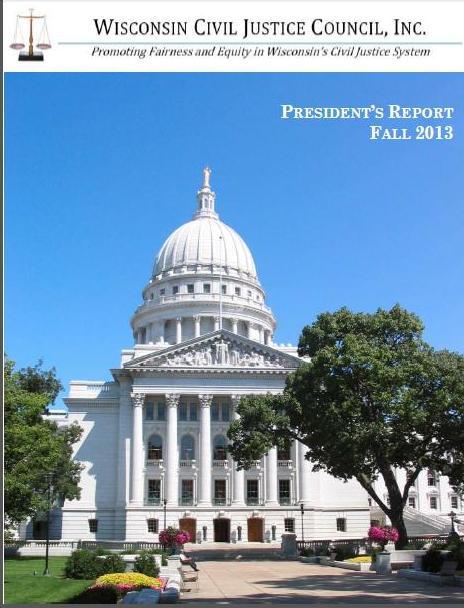The Fall 2013 edition of The Third Branch, a quarterly publication of the Director of State Courts Office, is now available.
One of many topics covered in this issue is the 35th anniversary of the creation of the Wisconsin Court of Appeals.
The Fall 2013 edition of The Third Branch, a quarterly publication of the Director of State Courts Office, is now available.
One of many topics covered in this issue is the 35th anniversary of the creation of the Wisconsin Court of Appeals.
Building off of the historic reforms signed into law in 2011-12, Gov. Scott Walker on Friday, December 13 signed three more important civil justice reforms into law. Below is a summary of each bill signed into law by Gov. Walker:
“The Wisconsin Civil Justice Council thanks Gov. Walker for his continued commitment to enhancing the state’s litigation climate and making Wisconsin a more attractive place to start and grow a business,” said Bill G. Smith, WCJC President and State Director of the National Federation of Independent Business.
The Milwaukee Journal Sentinel has published an opinion piece by WCJC officers Bill G. Smith and Scott Manley explaining why SB 13/AB 19, which provides transparency and prevents fraud in lawsuits involving personal injury trusts by creating certain discovery requirements during litigation, is good for Wisconsin businesses. Continue reading “Bill Protects Wisconsin Businesses in Asbestos Lawsuits” →
On January 27, 2011, Gov. Walker signed into law 2011 Wisconsin Act 2, which contained numerous civil liability reforms supported by the Wisconsin Civil Justice Council. One of the most important pieces of this legislation was the adoption of the Daubert standards for the admission of expert opinion evidence, bringing Wisconsin in line with the entire federal system and a majority of states.
Thanks to Act 2, Wis. Stat. § 907.02 now requires experts to be qualified by knowledge, skill, experience, training, or education. Testimony must be based upon sufficient facts or data, it must be the product of reliable principles and methods, and the witness must apply the principles and methods reliably to the facts of the case.
While it is clear that Daubert is now the absolute standard for expert testimony going forward, a recent court of appeals decision highlights the fact that there are still a limited number of cases in which it may not be applied because those cases were ongoing before the new law (Act 2) went into effect. Continue reading “Daubert Still the Law Despite Court’s Ruling” →
The Wisconsin Civil Justice Council has been the vanguard of the civil justice reform movement in Wisconsin since its 2009 formation. The many reforms championed by WCJC over the past three years will be highlighted by the American Tort Reform Association (ATRA) at its Annual Legislative Conference for State Coalition Leaders this fall.
Continue reading “ATRA Fall Conference to Highlight Wisconsin Reforms” →
Popular Wisconsin radio personality Vicki McKenna hosted Brian Sikma from Media Trackers for a discussion of the twisted lies opponents of AB 19/SB 13 are using to try and defeat the legislation.
Continue reading “Radio Host Exposes Myths and Mischaracterizations of Asbestos Trust Legislation” →
The U.S. House of Representatives is voting today on the bi-partisan Furthering Asbestos Claim Transparency (FACT) Act, which would require asbestos trust claimants to disclose certain information about relief they have sought before pursuing litigation. Continue reading “Asbestos House Cleanup” →
Christian Schneider’s most recent piece in the Milwaukee Journal Sentinel exposes the questionable legal action Congresswoman Carolyn McCarthy (D-N.Y.) is taking to seek remedy for her lung cancer – suing 70 companies that she believes contributed to her exposure to asbestos when she was a child while not mentioning she has been a smoker for 40 years. As Schneider explains, lawsuits like this threaten the solvency of trusts set up to compensate actual asbestos victims by firms that went bankrupt, while also placing a burden on solvent companies. Continue reading “More Transparency Needed in Asbestos Lawsuits” →
In her article that appears in The Hill Blog, Lisa Rickard, President of the U.S. Chamber of Commerce Institute for Legal Reform, discusses federal legislation that ensures future asbestos victims will be compensated.
According to the article, the federal Furthering Asbestos Claim Transparency (FACT) Act (H.R. 982) would require various asbestos trusts to file quarterly reports with the bankruptcy courts detailing who has filed a claim and how much money was paid out. Continue reading “FACT Act Preserves Money for Future Asbestos Victims” →
 At its fall meeting, the WCJC Board of Directors received and approved the Fall 2013 President’s Report. The report reviews WCJC’s successes to date and outlines WCJC’s goals for the future.
At its fall meeting, the WCJC Board of Directors received and approved the Fall 2013 President’s Report. The report reviews WCJC’s successes to date and outlines WCJC’s goals for the future.
.